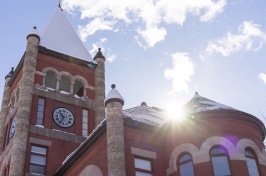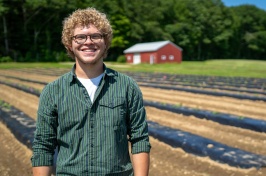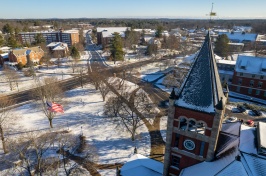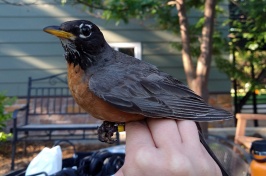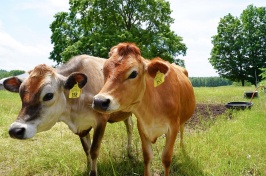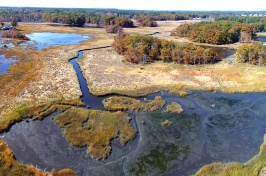UNH Kiwiberry Team Boosts Commercial Production with First Plant Verification Effort
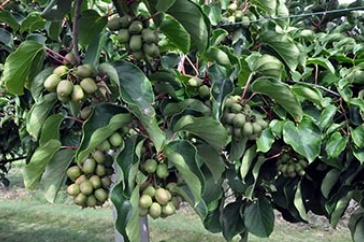
DURHAM, N.H.—One of the main barriers to commercial kiwiberry production for regional growers is knowing which varieties available from commercial nurseries are the most ideal to grow in the region. For the first time, growers can now source commercially grown kiwiberry plants that have been genetically verified as being recommended to grow in New England by researchers with the New Hampshire Agricultural Experiment Station at the University of New Hampshire.
Iago Hale, associate professor of specialty crop improvement and director of the UNH Kiwiberry Research and Breeding Program, and his team partnered with Hartmann's Plant Company of Lacota, Michigan, to genetically fingerprint the company’s kiwiberry inventory in an effort to certify the identity of varieties that Hale and his team have recommended for growing in New England.
Among the regionally recommended fruiting varieties available from Hartmann’s are Geneva 3 and Ananasnaya. Also available is a male pollinizer known as Meader Male, named after UNH botanist and longtime experiment station researcher Elwyn Meader, who developed the variety in the 1970s. Although Meader worked on kiwiberry for only a short period of time, Meader Male remains one of the best performing male kiwiberry cultivars offered by nurseries today. Complementing the flowering time of Meader Male are three other recommended male varieties, namely 74-46, 74-55, and Opitz Male.
“Sourcing reliable plant material, especially in large quantities and at a reasonable cost, is currently one of the main barriers for regional growers wishing to produce kiwiberries at a commercial scale,” said Hale. “We are very happy to be able to direct commercial producers to Hartmann’s for sourcing these verified cultivars.”
The kiwiberry is a grape-sized relative of the common fuzzy supermarket kiwi, but with a smooth skin and a sweet tropical taste. The plant can be grown in colder climates and has recently been increasing in popularity but is not yet a widely commercially grown berry. The goal of the breeding program is to provide the systematic investment needed to develop the kiwiberry into a novel, high-value crop, moving the species out of backyard gardens and into commercial production.
After learning about UNH’s kiwiberry program and its variety verification work, Hartmann’s reached out to the university to assure customers that they can trust the identity and the performance of the kiwiberry vines the company sells. Over the last year, Hale’s lab has genetically analyzed the company’s kiwiberry inventory and cross-referenced it to the lab’s collection to validate the identities of their offerings. Hartmann’s licensed the resulting data, which allows them to add a UNH-verified mark to their plants to indicate they are genetically verified varieties recommended for commercial production.
“These UNH-verified varieties will revolutionize the kiwiberry industry,” said Danny Hartmann, president of Hartmann’s Plant Company. “Thanks to the work by Dr. Hale, we are more confident in recommending varieties to growers and nurseries. We will continue to produce quality, true-to-name kiwiberries for the success of all of our customers.”
"We are excited to see this first license resulting from the kiwiberry program," said Jenna Matheny, director of technology transfer for UNHInnovation, which manages the university’s intellectual property. “UNH has a long history as a land-grant university of using its world-class research and expertise to collaborate with industry and provide information and innovations that address ongoing agricultural challenges. As a leader in kiwiberry research, UNH is proud to play a part in increasing commercial interest in the fruit."
Nurseries interested in genetically certifying their kiwiberry plant material are encouraged to contact the UNH Kiwiberry Research and Breeding Program.
This material is based upon work supported by the NH Agricultural Experiment Station, through joint funding of the National Institute of Food and Agriculture, U.S. Department of Agriculture, under award numbers 233561 and 1006928, and the state of New Hampshire.
Founded in 1887, the NH Agricultural Experiment Station at the UNH College of Life Sciences and Agriculture is UNH’s original research center and an elemental component of New Hampshire's land-grant university heritage and mission.
The University of New Hampshire is a flagship research university that inspires innovation and transforms lives in our state, nation and world. More than 16,000 students from all 50 states and 71 countries engage with an award-winning faculty in top ranked programs in business, engineering, law, liberal arts and the sciences across more than 200 programs of study. UNH’s research portfolio includes partnerships with NASA, NOAA, NSF and NIH, receiving more than $100 million in competitive external funding every year to further explore and define the frontiers of land, sea and space.
PHOTO AVAILABLE FOR DOWNLOAD
https://colsa.unh.edu/nhaes/sites/default/files/media/images/geneva3.jpg
Among the regionally recommended fruiting varieties available from Hartmann’s is Geneva 3. Credit: UNH
-
Media Contact
Lori Tyler Gula, PhD | NH Agricultural Experiment Station | lori.gula@unh.edu | 603-862-1452
Latest News
-
April 16, 2024
-
April 16, 2024
-
April 16, 2024
-
April 11, 2024
-
April 2, 2024











